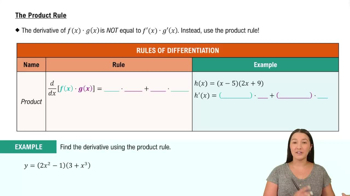Textbook Question
Find the slope of the curve y=sin-1 x at (1/2, π/6) without calculating the derivative of sin-1 x.
123
views
 Verified step by step guidance
Verified step by step guidance Verified video answer for a similar problem:
Verified video answer for a similar problem:



 7:26m
7:26mMaster Derivatives of Inverse Sine & Inverse Cosine with a bite sized video explanation from Patrick
Start learning